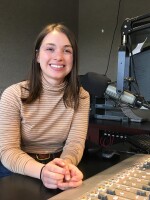Park City’s drop-and-load zone program, which allows permit holders access to premium parking spots, has been underway for a couple weeks now.
Park City implemented the drop-and-load zone program in the middle of December. The program provides nine pick-up and drop-off zones throughout Main Street for taxis, lodging shuttles and rideshare vehicles with their paid permit after 5 p.m.—the rest of the day, the zones are 15-minute parking for anyone. There are also three free zones for those without permits on Swede Alley, at the Wasatch Brew Pub and at the 9th Street turnaround.
So far, the city has issued 218 permits. Park City Economic Development Manager Jonathan Weidenhamer says the program is just one part of the city’s efforts to reduce traffic congestion and improve circulation in Park City.
“We're very pleased with how it's going," Weidenhamer said. "I think it's demonstrated to everybody that, with a lot of effort, we're willing to try some stuff. Sure, it's maybe a little clunky, but we're working on improving it day to day.”
There have been concerns about getting transportation network companies, such as Uber or Lyft, on board with the permit program. A representative from Lyft told the city council it wasn’t feasible for each driver to secure a permit, which costs $200. Senior Transportation Planner Alexis Verson says, though, 17% of permit holders drive for Uber or Lyft. Verson says that shows drivers are starting to understand the value of the premium drop-and-load zones and are passing that information onto others.
“We've been getting phone calls and emails from folks saying, hey, my friend who drives told me to contact you and get some more information, so we are working there," Verson said. "We do have some contacts at the regional level with Uber and Lyft, and we're working with them and starting to coordinate some meetings to find out how they can really help us implement this program, whether it's having them put this information into their apps for both drivers and riders."
Weidenhamer says the key to making the program work is having a staff member stationed at each zone for enforcement. The city council amended the 2020 budget to allocate more than $200,000 toward hiring a senior police officer, but city employees from parks, parking and other departments have also stepped up.
“Because it's confusing, and it's dark out there, and people who don't live here don't understand it, and there's a lot of signs, and having a warm body we've found, especially when it's busy, is really what's making this work," Weidenhamer said. "So it's become fairly labor-intensive, but that's the cost of doing business to accomplish the goals we set out to accomplish.”
Recent Park City Police logs show officers have observed many drop-and-load zone violations. Officers are also giving citations for moving violations, like double parking in the middle of Main Street. Those tickets cost $150. Weidenhamer says, though, citations are mostly issued for the most egregious violators.
“When I look at those police logs, and I compare the number of tickets we’re writing, they’re few and far between, in terms of tickets," Weidenhamer said. "We've towed a few, unfortunately, but we are issuing 30 and 40 warnings a night, between the police and the parking department, and so it's a lot of outreach a lot of education.”
The permits cost $200 for the year, though the pilot program will likely last only through the peak winter season and perhaps pop up again during peak summer events. For more information and answers to frequently asked questions, visit engageparkcity.org.




